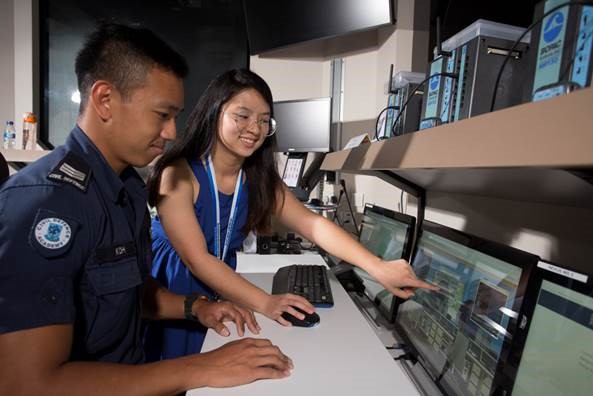 Ying Qi working with a Home Team officer (Photo: HTX)
Ying Qi working with a Home Team officer (Photo: HTX)
“As a Human Factors Engineer, I am able to integrate technology with human performance to help Home Team officers perform better with less.”
- Liaw Ying Qi, Design Engineer, Human Factors & Simulation Centre of Expertise
An email at the bottom of the computer screen swiped in.
Like clockwork, Ying Qi swiftly clicked on it and carefully read it. It turned out to be an inquiry from one of the Home Team Departments, asking for recommendations to apply Human Factors concepts to the project of designing special assistance lanes at Singapore’s checkpoints.
“A new project!” she noted with excitement. Methodically, she thought about the steps to address this enquiry, which will involve extensive research on international human factors standards and research work, focus group discussions, design work, and very likely a usability trial.
Understanding and addressing such human-centred needs of the Home Team is what Miss Liaw Ying Qi, 24, a Design Engineer from HTX’s Human Factors and Simulation Centre of Expertise, does to contribute to Singapore’s safety and security. Ying Qi is also engaged in innovative projects that put human user experience (UX) at the heart of technology to enable our Home Team officers to excel at their missions.
For instance, she is working on a study with the Immigration & Checkpoints Authority to identify the essential attributes of baggage and parcel screening officers. The aim of the project is to ensure that officers are equipped with the right skillsets and competencies to identify anomalies in scanned images and sieve out threats hidden in parcels and passengers’ belongings, such as firearms, sharp objects like knives, IEDs (improvised explosive devices), and contraband drugs.
We have been thinking of ways to help officers enhance their performance throughout their work shift. Being able to hear stories about their work and incorporate new technology into existing workspaces to help them excite me.
She is also working on another project to develop an adaptive workspaces system that can monitor and control human fatigue, attention, and mood in real-time to help officers on duty. When the officers are tired, the system can automatically inject invigorating scents and lighting to perk them up and boost their concentration.
“We have been thinking of ways to help officers enhance their performance throughout their work shift. Being able to hear stories about their work and incorporate new technology into existing workspaces to help them excite me,” she quipped.
.jpg?sfvrsn=ea76e51c_1) Ying Qi (2nd row, third from right) and HTX Associates preparing for HTX Launch (Photo: HTX)
Ying Qi (2nd row, third from right) and HTX Associates preparing for HTX Launch (Photo: HTX)
Ying Qi became aware of her interest in Human Factors Engineering during her six-month internship at the Changi General Hospital in 2018 where she did a project to assess the usability of social robotics in healthcare. Through the project, she realised that there was a gap in human-robot interaction. It also opened her eyes to the vast potential of using technology to do good for society.
When she graduated from the Nanyang Technological University with a Bachelors in Mechanical Engineering (Design) in 2019, Ying Qi began looking for a job that allows her to both serve society and enjoy abundant opportunities to improve technology usability in an environment where human touch is highly prized. The opportunity came when she saw an opening in Human Factors Engineering under the HTX’s Science and Technology Associate Programme. The HTX Associate Programme is designed to nurture young talent to develop the relevant science and technology expertise to support HTX’s work in public safety.
Work at HTX is fast-paced and very diverse to keep up with the needs of the various Home Team Departments ranging from SPF to ICA to SCDF. To expand her knowledge in Human Factors, Ying Qi is currently studying part-time for her Specialist Diploma in Human Factors. The course has exposed her to common Human Factors issues and feasible solutions. For instance, to cater to fatigue, a worker should only work a maximum of three night shifts before getting rest.
“I like the dynamic nature of the work which allows me to be exposed to different Human Factors issues, and it excites me that I am able to quickly grow in this field,” said Ying Qi.
At the end of the day, what keeps this promising talent juggling work and school is the ability to contribute to the greater public good and improve the lives of the Home Team officers as they carry out their mission to keep Singapore safe and secure.
“The Home Team is a very human-centric workplace, with many frontline officers safeguarding our nation every day and equally as many backend officers supporting frontline operations. As a Human Factors Engineer, I am able to make a direct impact on officers’ well-being and their work efficiency, and that keeps me motivated at work.”
We are always seeking inquisitive and innovative individuals to co-create extraordinary solutions with us.
Join us to be at the forefront of the finest tech capabilities in the field! Join Us

